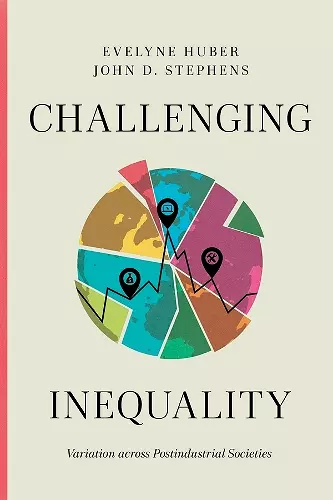Challenging Inequality
Variation across Postindustrial Societies
John D Stephens author Evelyne Huber author
Format:Hardback
Publisher:The University of Chicago Press
Published:1st Oct '24
£92.00
Supplier delay - available to order, but may take longer than usual.

A wide-ranging examination of how policies, parties, and labor strength affect inequality in post-industrial societies.
Not all countries are unequal in the same ways or to the same degree. In Challenging Inequality, Evelyne Huber and John D. Stephens analyze different patterns of increasing income inequality in post-industrial societies since the 1980s, assessing the policies and social structures best able to mitigate against the worst effects of market inequality. Combining statistical data analysis from twenty-two countries with a comparative historical analysis of Germany, Spain, Sweden, and the United States, Huber and Stephens identify the factors that drive increases in inequality and shape persistent, marked differences between countries. Their statistical analysis confirms generalizable patterns and in-depth country studies help to further elucidate the processes at work.
Challenging Inequality shows how the combination of globalization and skill-biased technological change has led to both labor market dualization and rising unemployment levels, which in turn have had important effects on inequality and poverty. Labor strength—at both the society level and the enterprise level—has helped to counter rising market income inequality, as has a history of strong human capital spending. The generosity of the welfare state remains the most important factor shaping redistribution, while the consistent power of left parties is the common denominator behind both welfare state generosity and human capital investment.
“This book is a genuine tour de force. Picking up where Piketty left off, Huber and Stephens give us an in-depth scrutiny of the causes behind rising inequality and poverty, and how these diverge across nations. The analyses point to multiple smoking guns, including globalization, new technologies, and deregulation. But what really matters are strong welfare states upheld by the power of labor.”
-- Gøsta Esping-Andersen | Pompeu Fabra University“Huber and Stephens turn their keen eyes to income inequality throughout the affluent world. Using a mix of data and methods, they seamlessly weave together three inter-related lines of analysis: inequality patterns across countries and over time, country-specific policy interventions that mitigate inequality, and the political and economic factors that shape both market-generated inequality and inequality-reducing policies. This superb book promises to reshape contemporary inequality scholarship.” -- Janet Gornick | coeditor of "Income Inequality: Economic Disparities and the Middle Class in Affluent Countr
ISBN: 9780226834634
Dimensions: 229mm x 152mm x 28mm
Weight: 653g
376 pages